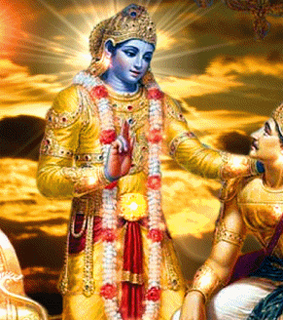 We are very fortunate to have access to Bhagavad Gita – described as Mother, Goddess, Shower of the Nectar of Advaita and the Release from the Endless Cycle of Rebirth – to answers the many questions that relate to our day to day living. The advice relates to every person who, like Arjuna, find that, when the minds alone is involved, it is clear what’s needed, but when feelings become engaged they are no longer convinced they know what’s the right thing to do. And, at the end of each chapter, Gita is described as Brahma vidya [Knowledge of Reality] and yoga shAstra [scripture that prepares the mind for Brahma vidya]. So the questions start from this point: Enlightenment is the unshakable knowledge ‘Aham BrahmAsi’ [I am Brahman]…
We are very fortunate to have access to Bhagavad Gita – described as Mother, Goddess, Shower of the Nectar of Advaita and the Release from the Endless Cycle of Rebirth – to answers the many questions that relate to our day to day living. The advice relates to every person who, like Arjuna, find that, when the minds alone is involved, it is clear what’s needed, but when feelings become engaged they are no longer convinced they know what’s the right thing to do. And, at the end of each chapter, Gita is described as Brahma vidya [Knowledge of Reality] and yoga shAstra [scripture that prepares the mind for Brahma vidya]. So the questions start from this point: Enlightenment is the unshakable knowledge ‘Aham BrahmAsi’ [I am Brahman]…
Q: What stops us from knowing this truth of oneself 24/7?
Gita: Mind has three basic defects:
1. it is impure (i.e. it is ruled by appetites and aversions)
2. it is unsteady (i.e. it is unable to hold one thought for any prolonged period of time, let alone forever – i.e. it is NOT capable of being ‘unshakable’)
3. what it holds to be true is erroneous.
Krishna describes this sort of mind of the irresolute as ‘bahu shAkAh anantAh’ – many branched and endless. Continue reading
